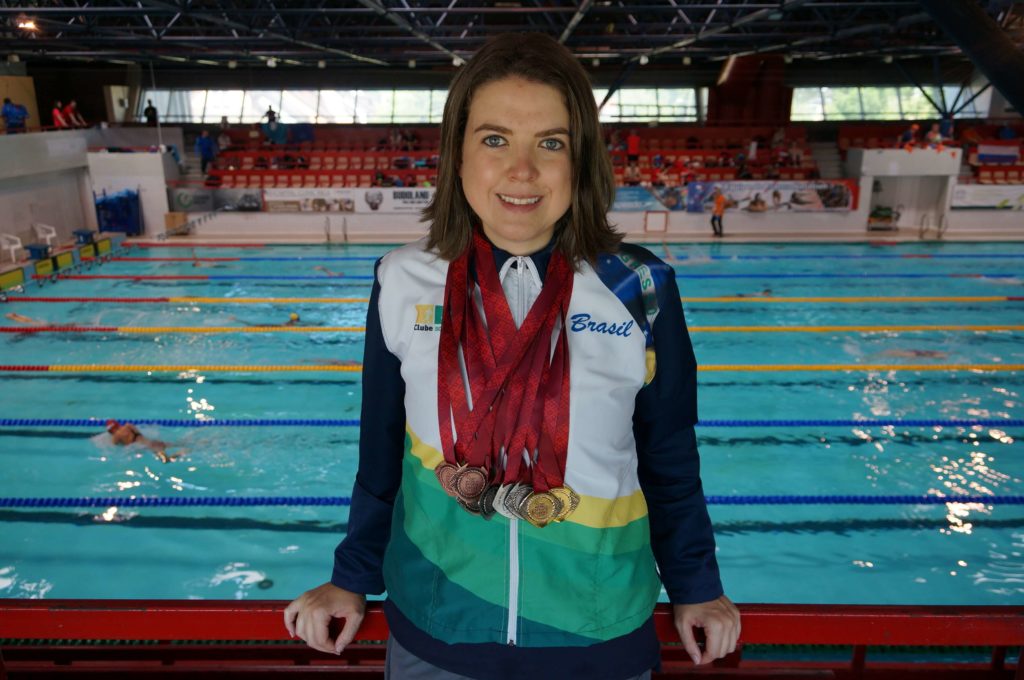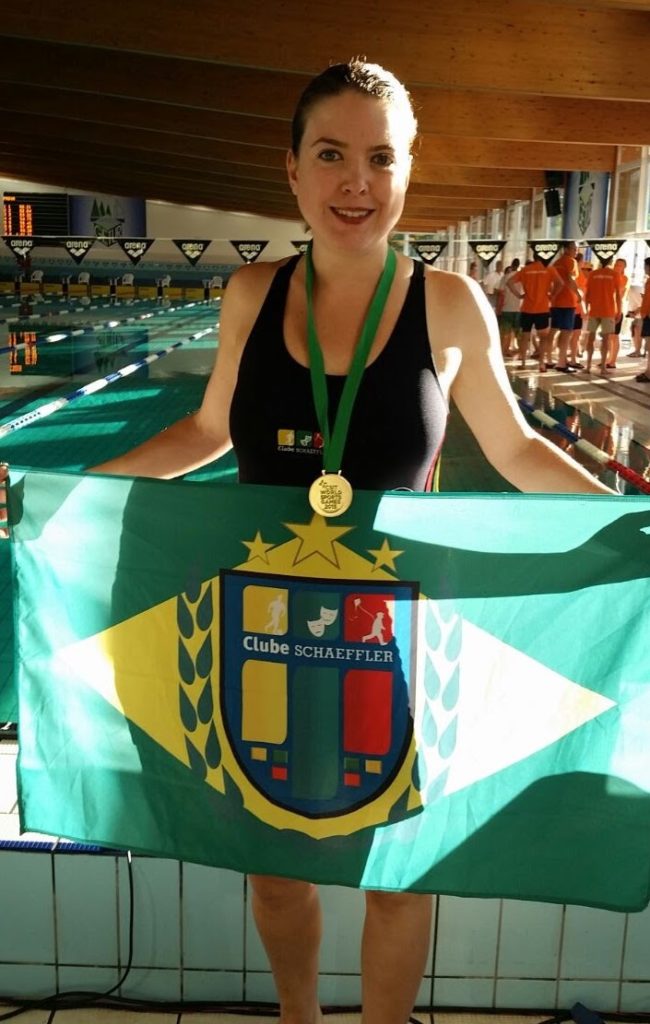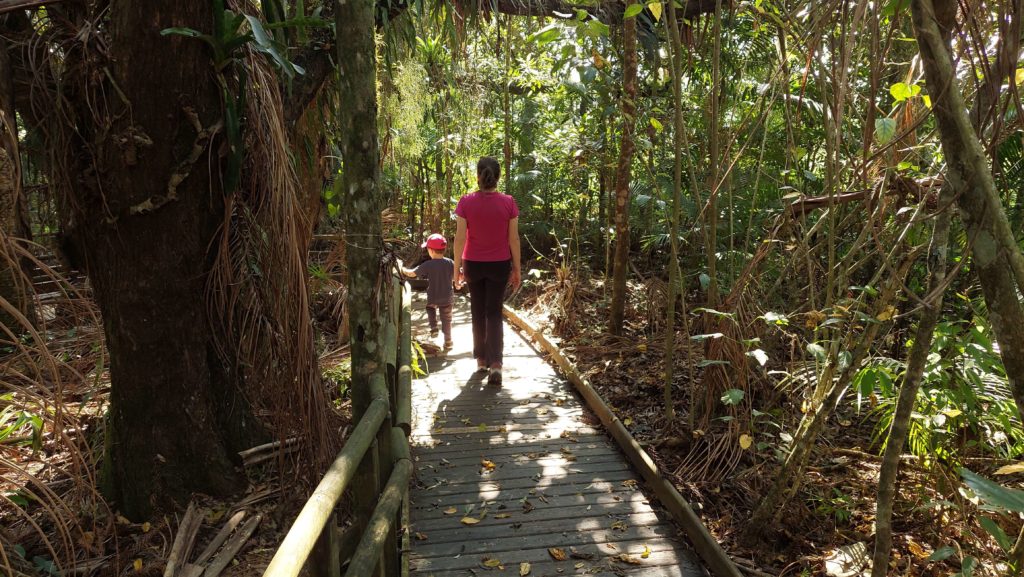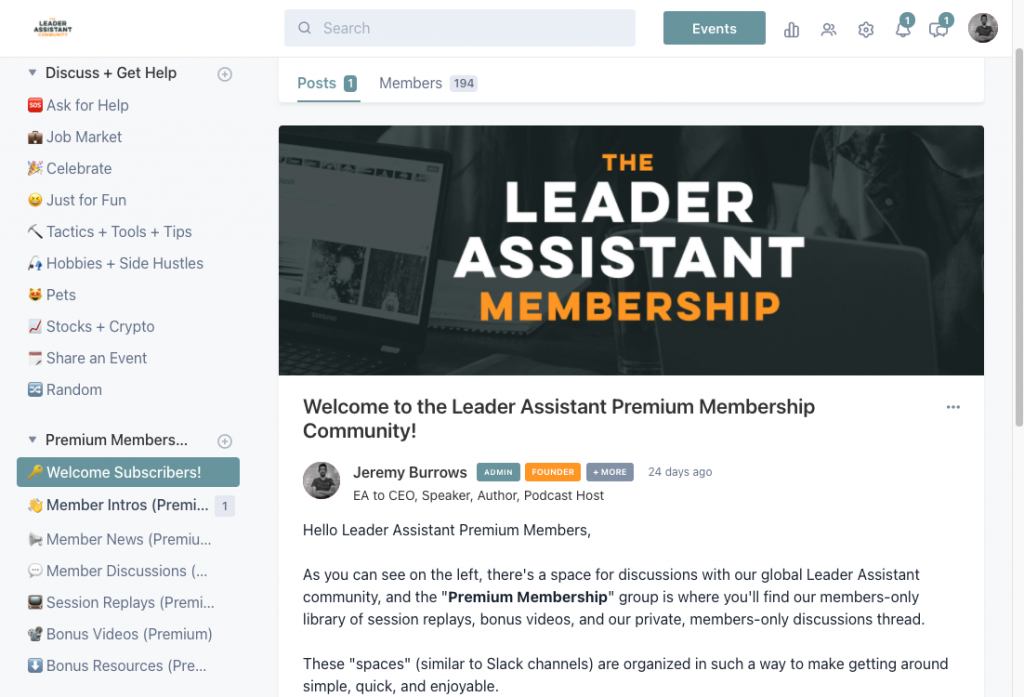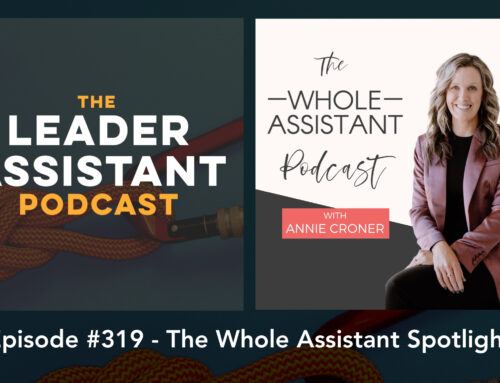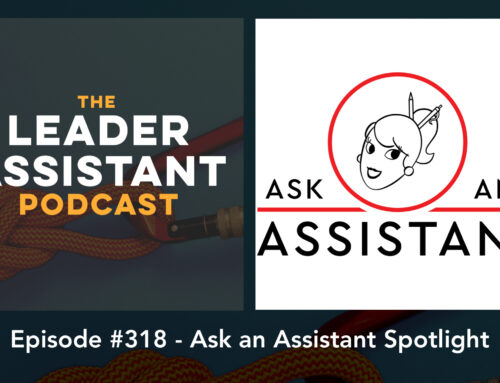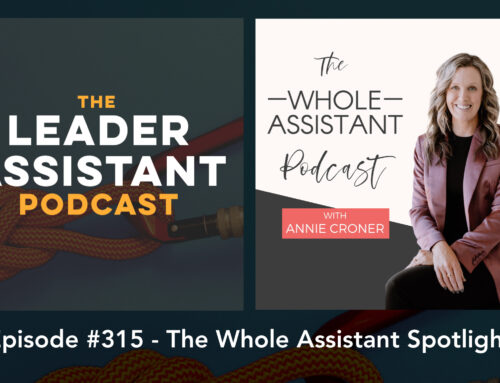After some interesting professional and international experiences that helped her acquire many of the skills for her job as an EA, Luiza Schneider achieved career fulfillment in the administrative profession, which she has been performing in for 15 years. Luiza currently works as Executive Assistant for Schaeffler South America.
In this episode of The Leader Assistant Podcast, Luiza talks about the importance of prioritizing self-care, specifically by finding and spending time on hobbies you love. She rightly encourages us to find hobbies that energize us and free us from the grind of “being productive.”
Luiza’s hobbies include competing in world swimming championships and hiking national parks.
Below are a few pictures Luiza sent me to share with you as a reminder that you are more than a professional – you are a human being with a life, so you might as well enjoy it!
CONNECT WITH LUIZA
- Luiza on LinkedIn
- Email Luiza at luizaschneider@yahoo.com
Also, check out this video of her competing in a backstroke competition:
LEADERSHIP QUOTE
If your actions inspire others to dream more, learn more, do more, and become more, you are a leader.
– John Quincy Adams
ABOUT LUIZA
Working for an International company in a high-demand job, Luiza Schneider has found a way to improve life in and out of the office by being part of her company’s swimming team and by developing new hobbies. Luiza has represented her company in city, state, national and world swimming championships for 13 years and she has hiked many natural parks on weekends.
Having different hobbies and being part of sport activities did not affect her commitment to her job, on the contrary, it strengthened her dedication to the company she works for. Luiza has good examples of how people can benefit from sports and hobbies by reducing stress, strengthening relationships and improving leadership skills.
THE LEADER ASSISTANT PREMIUM MEMBERSHIP
To learn more about how you can join the now 200+ growth-minded Leader Assistants, check out our Leader Assistant Premium Membership for ongoing training, coaching, and community.
LEADER ASSISTANT LIVE EVENTS
Check out our constantly updated schedule of events for admins and assistants at LeaderAssistantLive.com.
THE LEADER ASSISTANT BOOK
Download the first 3 chapters of The Leader Assistant: Four Pillars of Game-Changing Assistant for FREE here or buy it on Amazon or Audible.
JOIN THE FREE COMMUNITY
Join the Leader Assistant Global Community here, or the Facebook Group here for bonus content and to network with other assistants who are committed to becoming leaders!
SUBSCRIBE
Subscribe to The Leader Assistant Podcast so you don’t miss new episodes!
You can find the show on Apple Podcasts, Spotify, Google Podcasts, Pandora, and Stitcher.
Join my email list here if you want to get an email when a new episode goes live.
LEAVE A REVIEW
If you’re enjoying the podcast, please take 2 minutes to rate and review the show on Apple Podcasts here. Each review helps me stay motivated to keep the show going!
—
EPISODE TRANSCRIPT
Luiza Schneider 0:00
Hi everyone. My name is Luiza Schneider, and the leadership quote today comes from John Quincy Adams. If your actions inspire others to dream more, learn more, do more and become more than your own leader.
Podcast Intro 0:19
The leader assistant podcast exists to encourage and challenge assistants to become confident game changing leader assistants.
Jeremy Burrows 0:29
Hey friends, thanks for tuning in to The Leader Assistant Podcast. It’s your host Jeremy Burrows and it’s episode 131 You can check out the show notes at leaderassistant.com/131. Now before we jump into today’s interview, I wanted to invite you to join us at one of our leader assistant live events. Some of them are virtual online live events, some of them now are starting to be in person. So check out leaderassistantlive.com for professional development and training events for top executive assistants all over the world. Hope you can join us at a future event again leaderassistantlive.com to check out the schedule of events. All right, I hope you enjoy this episode. Hey friends, thanks for tuning in to The Leader Assistant Podcast your host Jeremy Burrows with you tonight. I’m speaking with Luiza Schneider. Luiza is an executive assistant for Scheffler South America. Did I say that right. Luiza Schneider?
Luiza Schneider 1:35
Yeah, that’s correct. Awesome. Well,
Jeremy Burrows 1:38
we’re glad to have you tonight. Where are you in the world today?
Luiza Schneider 1:42
Well, I am in Brazil to be more specific. I am in Sorocaba, a city, which is 100 kilometers away from San Paolo, in the southeast region of the country.
Jeremy Burrows 1:55
Amazing. And I’m trying to remember, did we originally get connected through LinkedIn? Or was it somewhere else?
Luiza Schneider 2:05
It was by LinkedIn. Okay.
Jeremy Burrows 2:07
Then the power of LinkedIn, I tell you what I you know, I tell the story, in my book, and I’ve told it in other podcast episodes, but you know, when I was in between jobs in kind of starting my career, over, if you will, I realized that I hadn’t been on LinkedIn. And I hopped on LinkedIn, I was like, wow, there’s actually people using this and people connecting and it’s just amazing. Fast forward five years, it’s almost, I guess, and all the connections that I’ve made, many of them have been on this podcast, are through LinkedIn. So yeah, it’s great that we were able to connect through technology. And I’m excited to chat with you, Louisa, you have over six, like 15 years of experience in the administrative profession. So I’m going to dive in and just hear a little bit more about you. Let’s start with your first job. What was your very first job? And what do you do today that you learned in that role?
Luiza Schneider 3:08
Well, my very first job was at McDonald’s, I was 16. At the time, I worked as a counter clerk, actually, I was a lot more than that, as McDonald’s has a great system of job rotation. So one day I would be at the counter helping customers through the ordering process. Another day, I would be making hamburgers. Anyway, the things I learned were discipline, doing things in a standard way to guarantee quality and increase productivity, teamwork, job rotation, it makes the job more dynamic, encouraged development, helps identify where employee work better. And of course, it gives a backup plan in case of an employee needs to leave. You know, I also learned to appreciate the hard work and sweat that it takes to perform those jobs, especially when you need to do it. While you’re having a bad day. You should know what they mean. But there is one thing that I find the most valuable at McDonald’s. When something goes wrong, the customers don’t consider all the factors in play. And they blame usually goes to the person they interact with. And I think most EAS are familiar with that situation. And that was really important to learn early in life to know to stay calm, acknowledged customer’s distress, introduce myself, learn about the person you are talking to listen, sympathize, empathize, apologize and of course offer a solution. And that was a great lesson.
Jeremy Burrows 4:55
That’s awesome. Yeah, a lot of lot of people started there. or careers flipping burgers at McDonald’s or similar places. So
Luiza Schneider 5:05
that’s a great place to learn. Yeah.
Jeremy Burrows 5:09
Awesome. Well, what other jobs have you had since then? And kind of how did you end up in the administrative assistant profession?
Luiza Schneider 5:19
Well, after McDonald’s, I worked as an au pair in the US. And after that, I spent six months in Denmark in an international school. And after I worked as an au pair, again, in Germany, you know, I really wanted to have international experiences, and learn other languages. My goal was to be an English teacher at a time. So when I came back to Brazil, that was in 2003, I started to work as an English teacher. But I felt that something was missing in I wanted to make use of my cultural background, and try new things. Then I gave myself a tried to the administrative profession, and I just fell in love with the role. You know, I love helping people and finding solutions. And I could use languages, my cultural background work in an international company. And when I started working as an AE, actually, I didn’t want to leave the teaching profession as I also left to be a teacher. So I worked during two years as an EA, and as a teacher, and but I couldn’t do it for a long time, as it was too time demanding. And I did not have time for hobbies and sports as much as I would like. So I ended up choosing the EA job, you know?
Jeremy Burrows 6:45
Yeah. So how did being a teacher help you be a better executive assistant?
Luiza Schneider 6:52
Well, I think all real life experiences can help the work of assistants. And in my case, being a teacher, or living in a foreign country, having contact with people from different countries, I think this, this helped me a lot to develop in, you know, skills helped me to deal with different and complex situations helped me to deal with different and why not complex people, you know, it opens my mind in a way that I feel ready to face any diversity that might come. And to be a teacher, I had to have all this experience before that. So I think that brought a lot to me. And that is exactly what I tell the young generations, they need to have real life experiences. They need to learn how to deal with life offline, you know, and they need to have real relationships. And that doesn’t need to be necessarily by living abroad, you know, you can be part of groups or doing different things. And then you can learn the skills of dress or career and even feel healthier, happier and healthier.
Jeremy Burrows 8:10
Yeah, that’s great. I think that oftentimes, we EAS are having to teach our executives and the leadership team how to do things. So knowing how to teach others is a good skill for sure.
Luiza Schneider 8:28
That’s true. Yeah.
Jeremy Burrows 8:30
So let’s transition to hobbies. And particularly sports. So what role has I’m a big believer in having hobbies as one of the best ways to resist burnout? And so well, how has what what are your hobbies first, and then how have those hobbies really helped you in your professional career?
Luiza Schneider 9:00
Well, it’s part and hobbies play a big role in my life. They actually have been part of my life since I was a teenager, and I could not never stop doing them. And in the current, my current sports and hobbies are swimming, hiking, and for hobby, I play the piano.
Jeremy Burrows 9:22
That’s awesome. I actually am a terrible swimmer. But I do love hiking. And I’m a terrible piano player. So I got at least I got one of the three right. All right. So okay, so swimming, apparently. I hear that you’re a pretty good swimmer. And you even have some professional experience. Before we get into those details. How do you balance your professional work with you know, playing piano and hiking and swimming
Luiza Schneider 10:01
Well, when it comes to hobbies and sports, especially sports, I have discipline, not just keep them in my routine. And I have them as a priority, you know. And for that it’s necessary to deal with time management. And there is a quote by Laura Vander cam that helped me to understand better how to deal with time. And the quote goes, we don’t build the lives we want by saving time, we build the lives we want, and then time saves itself. And this shows that time is highly elastic, we cannot make more time. But time we will stretch to accommodate what we choose to put it in. That’s one thing. And besides that, I was lucky enough to find a company that encourages each employee to practice parts. Schaeffler in Brazil has a club, which exists for over 40 years. It promotes his parts, practice organized leisure activities, and also organized traditional parties. And what is great about the club is that the membership is extended to the families so you have the chance to do leisure, and sport activities and be with your family at the same time. So the club has 430 athletes, which participate in the regional industry games, the armatures parts game and also the words parts game, organized by international workers and Amatrice parts Confederation. Bella’s Scheffler in Brazil has an internal magazine, which releases other results from championships. And that allows all the company community to know who is playing what and what the results are. And that creates this parts culture within the company. You know, my bosses, for example, they know when I participate in the competitions, their results, and they encouraged me to practice. They even call my attention when I am working longer so that I don’t use my soon as practice, you know. And, yeah, my point is, I have the discipline, but the encouragement from the company is one of the ways that helped me to balance professional life and sports activities.
Jeremy Burrows 12:23
How many employees are in the company overall?
Luiza Schneider 12:28
You mean, the world? Overall? Around 83,000 employees.
Jeremy Burrows 12:35
Wow. So you said there’s about 400. And so athletes are signed up for the support? Is that just in your region? Or is that in the world?
Luiza Schneider 12:46
And in my region? Okay,
Jeremy Burrows 12:48
so what what would you say? What would you estimate is the percentage of team members who are involved? It’s a pretty low percentage.
Luiza Schneider 13:01
I would say that, I would estimate 10%. Okay. There are a lot of people here involved with sports.
Jeremy Burrows 13:08
Yeah. I mean, that’s pretty impressive that 400 And something people, even for a big company, it’s pretty Yeah,
Luiza Schneider 13:16
yes. And no, the club exists for four years. And this culturales parte de sports bring brings a culture to the company that now encourages other people to do it.
Jeremy Burrows 13:33
Yeah. Well, that’s great that they’re encouraging. What would you say, though, to, let’s say, there’s an assistant listening right now to this podcast, and they’re thinking, you know, that’s awesome that your boss and your executive and your team encourages you to be active in your hobby. But my executive just wants me to work more how, how would you encourage someone like that, to really kind of stand up for themselves and for their, their balance in life?
Luiza Schneider 14:06
I would say, first, you have to acknowledge the importance of doing some sport or in or hobby activity. And you have to put this as a priority in your life. And when once you do that, you’re going to structure your time in a way that you are going to try to finish your work to be able to do your activity. And if you have a boss or an executive that don’t really understand that, I think, maybe showing them the benefits of it would be a great way to start, you know.
Jeremy Burrows 14:44
Yeah, I mean, you can present a business case. So, you know, this is when I do this when I exercise when I spend time on my hobbies, and so on and so forth. I’m more productive. I’m more focused at work. So what are some of those benefits for you? You that you’re happy and your your activity your sports bring to you and your work?
Luiza Schneider 15:07
Well, there are many benefits. There are many things you learn sports that you don’t learn in school, college, nor in any academic environment, which is self control, focus, handling pressure, dealing with different people and working in team. These are some of the benefits, benefits. And besides that, it’s good for me physically, it helps my mental health. You know, it’s great to have an outlet to express myself and challenge myself in a healthy way. Signs that it improves my self esteem, it reduces stress and consequently avoid burnout. For me, hobbies and sports are a healthy distraction that makes my thoughts have negative problems or challenges. And there is more. It helps me to stay social, and be collaborative. It allows me to make new friends, make connections, most of people that I have strong connections were made us parts. It also improves leadership skills. I think they want it’s one thing that this person could talk to this active, you know, and there are other benefits that people don’t mention much and don’t think much. One would be to get prepared for your old age, we often hear that we need to get ready for our old age financially. But what about getting prepared to be physically and mentally healthy, and that should be considered practicing parts and having hobbies can be very beneficial for that as well. And last but not least, would be transition to retirement. I often hear that people don’t know what to do after leaving their jobs. And a hobby can help you have a life outside of work, which makes it much easier to have an easier transition to retirement.
Jeremy Burrows 17:15
Wow. Yeah, that’s some great, great advice. I agree. On all of that. I think that it’s so important to invest in your mental health, your physical health, your social health. So yeah, it’s kind of like a life or life and career savings account that you’re putting into when you when you’re active in hobbies when you’re physically active when you’re working on your social skills. And like you said, it can make it easier to transition into retirement or transition to a different role. If you work, you know, transition from different organization.
Luiza Schneider 18:01
Yeah, yeah, that’s true. That’s a great way to to say that Jeremy, it’s like a savings account.
Jeremy Burrows 18:06
Yeah. Okay, so what about those listening who don’t have a hobby? What are some tips that you might share? For coming up with one or finding one and just how to start one and stick with it?
Luiza Schneider 18:26
Well, first, I would say make a plan to use the last digit of time that I mentioned before. And that means rethink how you structure your time. One of the main reasons people don’t pursue hobbies is that they feel like they don’t have time for them. Or while we may be really busy with our work, it’s likely that we can still find some spare hours each week to structuring your hobbies. So be mindful of what you already do in your free time. And you may be surprised how much of it you could substitute for a hobby instead of being on your screen. For example. Once you can designate time to pursue your hobbies and make it your routine, you are much more likely to stick with them. Another tip would be find something you’re really truly interested in, you know, take a moment to brainstorm what you’re in fact interested in. And here I have an interesting story to share. A friend told me once she would start learning how to cook as a hobby. Then I asked her but do you really like to cook? Then she said no, no, I have to cook for my family. Then I told her well, you cannot tell that to say that it’s a hobby that could be practicing or training but hobby should be something relaxing. Even though it has to be low pressure, and above all, it should bring us fulfillment. So when it comes to Hobby, we need to focus on purpose over productivity. It’s important that we separate our hobbies from our need to be productive. And anyway, my friend ended up learning how to cook. She does cook for her family. But as a hobby, she chose to ride motorcycles, which I find great.
Jeremy Burrows 20:34
Yeah, that’s definitely a different. man riding a motorcycle is different than cooking. That she found something she enjoys. Yeah. Awesome. So what? Tell us about a time maybe when you struggled to spend time on your hobby? And how did you get yourself back into gear?
Luiza Schneider 21:02
I could say that after I had my son, there was a very hard time to find time for my hobbies. And so after that, after that first difficulty, I talked to my partner and then we, we reschedule our activities. And then I found one day a week that I could swim. And then I came back to my practice. So I would say that was the most difficult time. But as I told you, it’s all about making a plan and structuring time and talking to partners and no bosses, whatever, there is always a way to, you know, to fit or to do something to get your activity in your calendar.
Jeremy Burrows 21:55
Yeah, that’s awesome. Yeah, it’s even just the conversation you had with your partner and like, hey, we need to, I want to prioritize this. Let’s be flexible and figure out a way to do this during this challenging season. So yeah, thanks for sharing.
Luiza Schneider 22:12
And there is one interesting thing, my partner knows that the benefits of it and he knows the importance of it. And he also does his activities, he does productivity. So we acknowledge it. So that’s why we are we really focus on making space to find it in our routine. Yeah.
Jeremy Burrows 22:34
Great, well, Louisa, what makes an assistant a leader?
Luiza Schneider 22:41
Well, in my opinion, you will start to become a leader, when besides doing what you’re asked to do, we start asking yourself how things can be done in a better way. And that is the point where you can get people to think together and start to show that you are there not only to accomplish tasks, but you’re there to improve process to help people develop themselves. And also, when you help your leader to see things that you won’t be able to see, as he’s too busy with a ton of work. That is the time that your role become too much more meaningful, and you’ll develop leadership skills.
Jeremy Burrows 23:24
So that’s great, was there a time when your experience competing in these you know, high level swimming competitions? Could you give us maybe a specific example and kind of put you on the spot on a specific example from those times? Where you transfer that or translated that into a leadership moment at work? Maybe it was like a conflict you had with a with a sport team paid or and then you had a conflict with someone at work and you were able to handle it, because you did and you know, in the pool, is there is there any any specific example you could share?
Luiza Schneider 24:17
Well, when I think about the relay, for example, we have to have a strategy to choose the best player to start and the person has to have a profile to be this part because this person has to be very concentrated not to jump before and then there is the second person, the third person and then the fourth person and the fourth person needs to be if the very first one to end the competition. And these people have to have the right profile to be in the right sequence and when they think Cut, for example, in a meeting or event, sometimes you have to find the right people with the right profile to show, you know, to organize it. So that’s one comparison that just came to my mind.
Jeremy Burrows 25:16
Yeah, that makes sense. I gotta put the right player on the right seat on the bus. What? What position? Are you typically? The first one second? 1/3? One or fourth?
Luiza Schneider 25:28
I’m the first one.
Jeremy Burrows 25:30
First one. Nice.
Luiza Schneider 25:31
Yeah, I have I’m the one that needs to jump in needs to be concentrated. But before?
Jeremy Burrows 25:40
Love it. Love it. All right. Well, to wrap things up, what tips would you share for assistants who are just starting out their career?
Luiza Schneider 25:52
Well, yes, have a very strategic position. And be aware of it in the importance and value of this job. And in order to perform your job, you should get to know all the departments in the company, what people do in who the people are. So II first started in a company now, ask if they can offer a complete integration agenda. And that will make a great difference. In my case is parts helped me to a lot with it. Actually, making friends in sports is a natural way to networking without knowing that you’re not working, if you know what I mean. But I know that not all the companies have sports program. So the integration agenda would be a great help. And other tips I would give would be the one I already mentioned, you know, have real life experiences and as much as you can, and have a hobby or practice part, you know, the earlier the better.
Jeremy Burrows 26:59
Yeah. That’s great. I think one thing that I think I answered this question the other day, and I basically said take one at least one day off every week, like a 24 hour stretch where you’re not online or not looking at your email, and then don’t miss your vacations, those those kind of my advice to beginners because, as you said, you got to start early. You got to get into that habit and otherwise can be harder to do later on in your career.
Luiza Schneider 27:25
That’s true. That’s true. So you first start with this heavy having the this as a habit, you know, to take this time off, that’s going to be much easier to keep doing it later. Yeah.
Jeremy Burrows 27:40
Awesome. Well, Louisa, how many languages can you speak?
Luiza Schneider 27:45
three languages Portuguese, English and German.
Jeremy Burrows 27:49
Okay, so I’ve done this a couple times on my podcast. I think I already have a German version. So would you mind saying thank you for listening to The Leader Assistant Podcast in Portuguese Portuguese?
Luiza Schneider 28:04
Oh, I’ll be happy to do that.
Jeremy Burrows 28:06
All right. Well take it away whenever you’re ready.
Luiza Schneider 28:08
Okay, mighty Gala, provide Superdome leadership podcast. Moti Mottola, GAVI villas, pessoas participant.
Jeremy Burrows 28:20
Love it. Love it. It’s wonderful. Thank you for doing that. So how do you
Luiza Schneider 28:26
know it’s hard to switch languages?
Jeremy Burrows 28:30
Oh, trust me, I’m, I can barely, barely speak English. So I I’m very, very impressed by those that can speak more than one language. And you’ve got three. So nice. Nice work. So okay, well, how thank you so much for being on the show. How can people reach out to you and say, hi, if they’d like to connect?
Luiza Schneider 28:54
Well, they can find me at LinkedIn. And they can also email me at Luiza Schneider@yahoo.com.
Jeremy Burrows 29:03
Perfect. And I’ll share your LinkedIn profile URL in the show notes. And yeah, I appreciate it. Maybe someday, we’ll be in the same country and we can connect and maybe give me some swimming lessons.
Luiza Schneider 29:19
I would love to do that.
Jeremy Burrows 29:21
All right. Well take care and yeah, thanks again for being on the show.
Luiza Schneider 29:26
Thank you know Jeremy, what you’re doing is incredible. Having an EAA community is a great way to empower this role in creating this network is so powerful. We have so much to share and contribute to with each other. Thank you so much for that.
Jeremy Burrows 29:42
You’re welcome, Luiza. My pleasure. Thanks again, Louiza for a great interview. Be sure to check out the show notes at leaderassistant.com/131 to connect with Luiza and I even included a couple of pictures and video of her We’re doing her hobbies and activities and sports. So check that out at leaderassistant.com/131 And we’ll talk to you soon
please listen you on Apple podcasts goburrows.com

